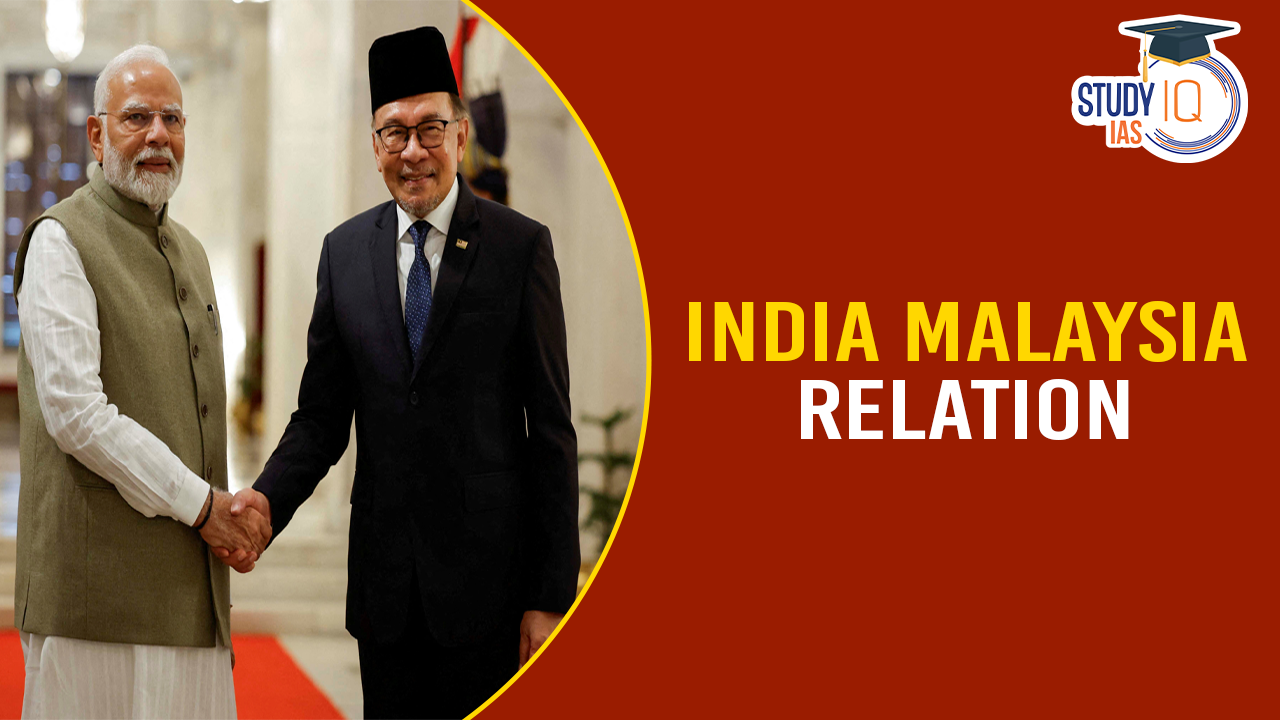Table of Contents
India-Malaysia Relation
- India and Malaysia share a long history of economic, cultural, and political ties, with significant interactions over decades.
- Relations experienced challenges in recent years due to regional tensions and political changes in both countries.
- Recent geopolitical shifts and strategic concerns in the Indo-Pacific have led to a renewed focus on strengthening ties between these two nations.
Downfall in Relations between India and Malaysia
- Relations between India and Malaysia saw a decline, particularly during the period of 2019-2020, due to differences over issues like Kashmir and Malaysia’s stance on international forums.
- Diplomatic strains resulted in decreased trade and cooperation, reflecting the downturn in bilateral ties.
- Political transitions in Malaysia, along with shifting global dynamics, caused a temporary cooling of diplomatic engagements.
Recent Recovery in Relations
- Relations began to recover after 2022, with renewed diplomatic engagements under Malaysia’s new leadership.
- Prime Minister Anwar Ibrahim’s visit to India in August 2024 marked a turning point, signifying a major step towards reviving and enhancing bilateral ties.
- This visit resulted in the elevation of the India-Malaysia relationship to a Comprehensive Strategic Partnership (CSP), focusing on trade, defense, technology, and cultural exchanges.
Importance of India-Malaysia Relations
- Economic Ties: Bilateral trade stands at USD 20 billion, with Malaysia being India’s 16th largest trading partner. India plays a crucial role in Malaysia’s economic landscape, and vice versa.
- Geopolitical Significance: Both countries are key players in the Indo-Pacific and support ASEAN centrality. Their cooperation is vital for regional security and economic integration.
- Cultural and Diaspora Connections: Malaysia is home to a large Indian diaspora of around 3 million people, further enhancing people-to-people ties.
- Strategic Cooperation: Areas like defence, technology, and counter-terrorism are critical points of collaboration that bolster regional stability.
“We Must Move Away from the US Dollar” – Malaysian PM in India
- During his 2024 visit to India, Malaysian Prime Minister Anwar Ibrahim called on the Global South to reduce reliance on the US dollar in trade settlements.
- He criticized the current USD-dominated financial system as obsolete, advocating for local currency trade to diminish the negative impacts of dollar dependency.
- Malaysia, for example, conducts 20% of its trade with China in local currencies and aims to expand this practice with other nations, including India.
- India and Malaysia are exploring local currency trade settlements using the Indian Rupee (INR) and Malaysian Ringgit (MYR), representing a significant shift in their economic relationship.
Way Forward
- Enhanced Strategic Cooperation: Both countries are committed to further deepening ties through defence technology exchanges, digital payment integration, and increased bilateral trade using local currencies.
- Strengthening Economic Relations: Expanding the Comprehensive Economic Cooperation Agreement (CECA) and promoting investments in emerging sectors like fintech, semiconductors, and defence will be key to future economic ties.
- Regional Security Collaboration: India and Malaysia’s cooperation in the Indo-Pacific will help address regional security challenges, with joint military exercises and shared intelligence on counterterrorism.
- Technology and Innovation: Collaboration in areas such as artificial intelligence (AI), quantum computing, and digital payments will enhance both countries’ capacities in the digital economy.
- BRICS and Global South: Malaysia’s potential inclusion in BRICS, supported by India, may open new avenues for multilateral cooperation, helping both nations strengthen their positions in global economic forums.


 Defence Acquisition Council (DAC): Role,...
Defence Acquisition Council (DAC): Role,...
 Alternate Wetting and Drying (AWD): A Cl...
Alternate Wetting and Drying (AWD): A Cl...
 Makaravilakku Festival: Significance, Ri...
Makaravilakku Festival: Significance, Ri...

























